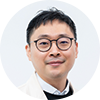Dr. Ki Hong Choi is an exceptional interventional cardiologist with outstanding passion and a career in clinical research. Aspiring to improve the prognosis of patients, he has conducted numerous research in various fields, including coronary artery disease, myocardial infarction, cardiogenic shock, and advanced heart failure. The 11th winner has published 54 papers as the first author and 10 papers in core clinical journals, resulting in 560 impact factors.
Our team is delighted to introduce his excellent achievement at the 11th Best Young Scientist Award and support his continued commitment to clinical research in the coming years. Congratulations, Dr. Ki Hong Choi!

